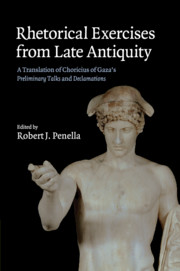 Rhetorical Exercises from Late Antiquity
Rhetorical Exercises from Late Antiquity Book contents
- Frontmatter
- Contents
- List of contributors
- Foreword
- Introduction
- I CHORICIUS, PRELIMINARY TALKS
- II CHORICIUS, DECLAMATIONS
- 2 Declamation 1 [X]:
- 3 Declamation 2 [XII]:
- 4 Declamation 3 [XIV]:
- 5 Declamation 4 [XVII]:
- 6 Declamation 5 [XX]:
- 7 Declamation 6 [XXIII]:
- 8 Declamation 7 [XXVI]:
- 9
- 10 Declamation 9 [XXXV]:
- 11 Declamation 10 [XXXVIII]:
- 12 Declamation 11 [XL]:
- 13 Declamation 12 [XLII]:
- Epilogue: The fortune and reception of Choricius and of his works
- Bibliography
- Index
5 - Declamation 4 [XVII]: <Miltiades>
from II - CHORICIUS, DECLAMATIONS
Published online by Cambridge University Press: 29 January 2010
- Frontmatter
- Contents
- List of contributors
- Foreword
- Introduction
- I CHORICIUS, PRELIMINARY TALKS
- II CHORICIUS, DECLAMATIONS
- 2 Declamation 1 [X]:
- 3 Declamation 2 [XII]:
- 4 Declamation 3 [XIV]:
- 5 Declamation 4 [XVII]:
- 6 Declamation 5 [XX]:
- 7 Declamation 6 [XXIII]:
- 8 Declamation 7 [XXVI]:
- 9 Declamation 8 [XXIX]:
- 10 Declamation 9 [XXXV]:
- 11 Declamation 10 [XXXVIII]:
- 12 Declamation 11 [XL]:
- 13 Declamation 12 [XLII]:
- Epilogue: The fortune and reception of Choricius and of his works
- Bibliography
- Index
Summary
[THEME]
After the barbarians' [i.e., the Persians'] flight from Marathon, Miltiades asked the Athenians for a fleet, promising, if he received it, to provide the city with a large sum of money from a certain country. This is how he put it, concealing the name of the country, and he took all the ships he asked for and sailed to the island of Paros, which had sided with the barbarians. He placed the Parians under siege; but when he wished to force an entrance [into the town], he was maimed in the leg. Xanthippus accuses him of deceiving the people by charging that he made the Parians a gift of his withdrawal. <Let us take the part of the defendant.>
<EXPLANATORY COMMENT>
[1] Marathon was not enough to free Miltiades of suspicion, and despite that famous battle he was haled into court, scarcely able to walk because of the pain of his injury. The Athenian democracy took the view that not even the foremost citizen should escape investigation. This is why I come here and guide the man's steps. [2] He is represented by Herodotus as a silent character who only indicates his injury with his hand. But for my part, I wanted to hear Miltiades' tongue, and it distressed me to see such an orator remaining speechless.
- Type
- Chapter
- Information
- Rhetorical Exercises from Late AntiquityA Translation of Choricius of Gaza's Preliminary Talks and Declamations, pp. 96 - 109Publisher: Cambridge University PressPrint publication year: 2009


